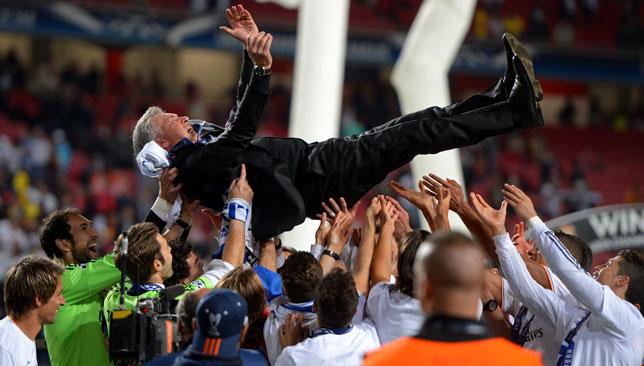
When the identity of the world’s greatest football coaches is debated, the discussion usually comes down to a straight fight between Jose Mourinho and Pep Guardiola.
Spain boss Vicente Del Bosque, Dutchman Guus Hiddink, Atletico Madrid’s Diego Simeone and Borussia Dortmund’s Jurgen Klopp are also highly esteemed, with occasional mentions for people like Arsene Wenger, Louis van Gaal and the choice of the football hipsters, Marcelo Bielsa.
One name who rarely features, however, is Carlo Ancelotti, who is somehow hardly ever regarded as an ‘elite’ coach despite his long list of achievements over the last two decades.
The statistics speak for themselves.
Following Real Madrid’s stunning Champions League triumph on Saturday night, Ancelotti is now one of just five coaches to have won Europe’s most prestigious competition with more than one club.
Furthermore, the Italian has also joined former Liverpool boss Bob Paisley as the only two managers to have won the European Cup or Champions League on three occasions, following his successes with AC Milan in 2003 and 2007.
With a CV like that, it should be impossible to deny Ancelotti a place amongst the greatest of his profession.
So why does he figure so rarely in those discussions?
A big part of the answer is that Ancelotti and his teams have never been aligned with a single philosophy.
While Guardiola invented tiki-taka and Mourinho is the ultimate cut-and-thrust counter-attacking merchant, Ancelotti does not impose a pre-determined style of play, preferring to be guided by the players at his disposal and fashion a strategy around their strengths and weaknesses.
At his previous two clubs Chelsea and Paris Saint-Germain, for example, he was often criticised for fielding teams with a lack of width – even though he won the league and cup double with Chelsea and led PSG to their first French title in nearly 20 years.
With Gareth Bale and Cristiano Ronaldo supplemented by raiding full backs Marcelo and Dani Carvajal, however, ‘lack of width’ is hardly an accusation that has been thrown in Ancelotti’s direction during his first season at Real Madrid.
And perhaps that’s an even greater accomplishment than the approach of innovators like Guardiola and Mourinho.
There is more than one method of winning a game of football, and Ancelotti is comfortable employing any of them.
The other key reason the lack of praise showered upon Ancelotti is his calm, unsensational personality.
While other leading bosses are electrifying public speakers, knowingly capable of generating headlines and soundbites, Ancelotti shies away from the limelight.
He’s certainly not a dull speaker, but neither is he particularly captivating – he comes across as everyone’s favourite uncle rather than a cutting-edge technical genius.
In our celebrity-obsessed times, it can be difficult for us to realise that an avuncular figure such as Ancelotti can be just as successful – or more so – than his more magnetic peers.
Now, more than ever, we should.